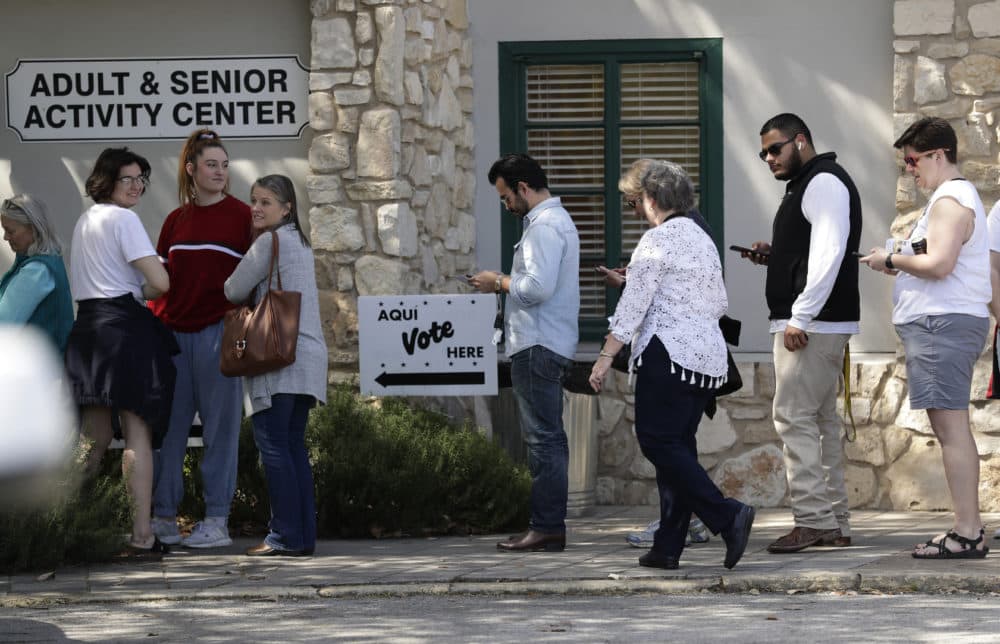Advertisement
Commentary
Know Your Voting Rights. Our Democracy Depends On It

Recent events — from Iowa’s caucus debacle to fresh reports of foreign interference — have deeply shaken the American people’s faith in our democratic institutions. As voters prepare to make a historic decision in November, we must restore that faith by ensuring that our electoral system is based on integrity.
This year demands free and fair elections, and as Washington remains deadlocked, states must take the lead by protecting and strengthening voting rights for all.
Free and fair elections are the foundation of our democracy, but as we learned in 2016, the process is highly fragile. Even before he was elected, Donald Trump indicated that he might not accept unfavorable results, threatening the basic idea of a peaceful transfer of power. After his victory, President Trump made — and has since repeated — the false claim that “millions of people” voted illegally for his opponent. Throughout the 2016 race, Trump openly solicited help from Russia, and a majority of Americans believe he still encourages foreign interference in our elections.
The Trump administration has also made attempts at active voter suppression, trying and failing to include a citizenship question on the census. This would have discouraged responses to the U.S. Census Bureau in immigrant communities, and would have likely resulted in less political representation and less access to federal programs.
It’s not just the Trump administration. In states across the country, voter suppression initiatives — from voter purges to reduced ballot access — continue to disenfranchise eligible voters, especially people of color, poor people, elderly people, students and people with disabilities.
States have been emboldened, in part, by a 2013 Supreme Court decision that removed critical protections from the Voting Rights Act of 1965. The ACLU aggressively counters these efforts, and takes states across the country to court to preserve access to the ballot. But even in cases in which the ACLU has ultimately succeeded, these discriminatory changes to voting laws remained in place for months or even years while litigation proceeded, tainting our elections.
In Florida, for example, voters overwhelmingly passed a ballot initiative to restore voting rights to formerly incarcerated people with felony convictions. No sooner had it passed, than lawmakers passed what is effectively a poll tax, preventing people from voting until they had paid all fines and fees associated with their prior conviction. The ACLU challenged the law. Just this month, a federal appeals court upheld a ruling blocking the Florida law, ruling that a person’s right to vote cannot be contingent upon their ability to pay.
Massachusetts is not immune. Although automatic voter registration went into effect this year, prospective voters who want to register still face an arbitrary 20-day cutoff period, and every year, people are disenfranchised because of errors or delays in the registration process. Anybody can find themselves on the wrong side of the voter registration deadline — especially people working multiple jobs, people experiencing housing instability, people with disabilities, and people with less reliable transportation.
Advertisement
Anybody can find themselves on the wrong side of the voter registration deadline
Election Day registration, a proposal currently before lawmakers on Beacon Hill, levels the playing field so all qualified voters are able to participate fully in our democracy. Election day registration is the gold standard for voter registration, making elections more accurate, accessible and easier to administer. By allowing people to register or update their registration on Election Day, we eliminate arbitrary barriers to voting for everyone and give voice to marginalized — and often disenfranchised — communities. States like Massachusetts have an opportunity to show the country what free and fair elections look like, and lawmakers should embrace that opportunity by passing Election Day registration legislation.
We’re all better off when more Americans participate in our democracy. While the ACLU is litigating more than 25 cases nationwide to challenge voter suppression and improve ballot access, we cannot rely on the courts alone.
Right now, you can contact your Massachusetts state legislator and urge them to support Election Day registration. You can also call on your member of Congress to cement the legacy of the Voting Right Act, and make clear that our next president must be committed to protecting and advancing the fundamental right to vote for all Americans.
Perhaps most importantly, tell your friends and family to exercise their right to vote this election. And know your rights before you get to the polling booth. Our democracy depends on it.
